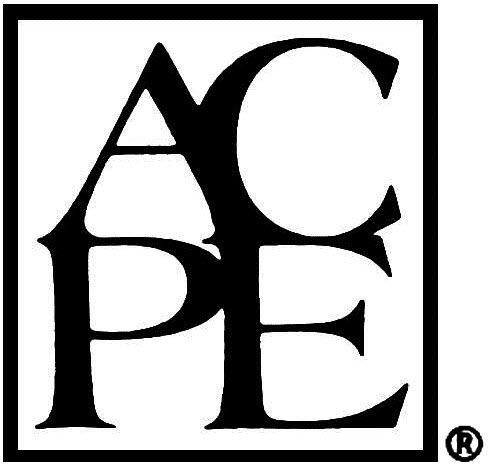Institute for Inclusive Excellence 2025 CPE Activity Announcement
May 7-9, 2025
10:00 a.m.-5:00 p.m.
Virtual: Zoom Meeting
Target Audience
AACP encourages any faculty member, administrator, or staff person at an institution with a pharmacy college or school to attend. Regardless of attendance at an EDI Institute in the past, we encourage you to attend this event.
Agenda
The Institute agenda can be accessed here.
CE Sessions
Thursday, May 8
10:30 a.m.–11:15 a.m.
Session 2: Reimagining Professional Identity Formation (PIF): Integrating Marginalized Identities & Diverse Perspectives
At the completion of this activity, participants will be able to:
- Describe the difference between professionalism and Professional Identity Formation (PIF).
- Examine the historical development of PIF theoretical frameworks and their limitations in addressing the experiences of learners with marginalized identities.
- Develop strategies to foster an inclusive approach to PIF that supports the diverse identities of pharmacy students and practitioners.
Application-based (0581-0000-25-032-L99-P; 0.75 Contact Hour)
Natalie Rosario, Pharm.D., MPH, BCACP, Clinical Assistant Professor, Ambulatory Care Pharmacist, Pharmacy Practice and Translational Research, University of Houston College of Pharmacy; Sally A. Arif, Pharm.D., BCPS, BCCP, Professor of Pharmacy Practice, Midwestern University College of Pharmacy-Downers Grove, Clinical Pharmacist, Cardiology-Rush University Medical Center, Affiliated Faculty, Center for Community Health Equity & Founder/CEO, The Equity-Minded Collective
1:00 p.m.–1:45 p.m.
Session 3: Universal Design for Learning and the Ability Spectrum: Strategies to Diversify Your Teaching for Neurodiverse Learners and Learners with Differential Abilities & Creating a Sense of Belonging Amidst Change
At the completion of this activity, participants will be able to:
- Define neurodivergence and neurodiversity.
- Identify barriers in the pharmacy classroom for neurodivergent learners.
- Explain the key principles of Universal Design for Learning (UDL) that support inclusive teaching.
- Implement inclusive teaching and assessment strategies that promote a sense of belonging and support diverse learners in pharmacy education.
- Apply practical, legally appropriate adaptations to course content and clinical learning environments that address the individual needs of the students.
Application-based (0581-0000-25-033-L99-P; 0.75 Contact Hour)
Ashim Malhotra, Ph.D., FAPE, Assistant Vice President, California Northstate University; Tanja Miller Redd, MBA, Ph.D., Academic Program Coordinator – Alumni and Professional Affairs, Auburn University - Harrison College of Pharmacy
1:45 p.m. - 2:45 p.m.
Session 4: Approaches to Empower Individuals to Pursue Career Pathways that Advance Health Parity and Inclusive Excellence
At the completion of this activity, participants will be able to:
- Identify the gaps between academic training and real-world applications addressing health equity and health disparities.
- Discuss the skills, experiences and training that are beneficial for pharmacy faculty, practitioners, and researchers to contribute to solutions that promote health equity.
- Highlight examples of career opportunities for pharmacy trainees and pharmacists to address health disparities and advance health equity/parity.
Knowledge-based (0581-0000-25-034-L99-P; 1.00 Contact Hour)
Jacinda C. Abdul-Mutakabbir Pharm.D., MPH, Assistant Professor of Clinical Pharmacy, University of San Diego Skaggs School of Pharmacy and Pharmaceutical Sciences; Donney John, Pharm.D., Executive Director, NOVA ScriptsCentral; Omolola Adeoye-Olatunde, Pharm.D., M.S., Assistant Professor, Pharmacy Practice, Purdue University College of Pharmacy
 AACP is accredited by the Accreditation Council for Pharmacy Education as a provider of continuing pharmacy education. Pharmacists may earn up to 2.50 hours of CPE credit following the completion of the accredited continuing education activities and corresponding learning assessments and evaluations.
AACP is accredited by the Accreditation Council for Pharmacy Education as a provider of continuing pharmacy education. Pharmacists may earn up to 2.50 hours of CPE credit following the completion of the accredited continuing education activities and corresponding learning assessments and evaluations.
Information on how to obtain continuing education credit
To obtain CPE credit, pharmacists must attend the live accredited continuing education activities, complete the activity assessments with a passing score of 75%, and submit the CE session evaluations via the AACP CE administration platform, Learning Express CE (LECE). An access code will be provided at the conclusion of each accredited continuing education activities. Attendees will need the access code to complete the learning assessments on LECE. Attendees will have 45 days following the Institute to complete the assessments and evaluations. Access to the session activity evaluations and assessments in LECE will be denied after Monday, June 23, 2025, 11:59 pm ET.
CPE credit information will be electronically transmitted to CPE Monitor. Pharmacists should log in to their NABP e-profile to access information about their completed CPE and to print a valid statement of credit if needed.
Note: It is imperative that pharmacist attendees’ NABP e-Profile ID and birthdate (in MM/DD format) are correctly entered in their profile and correspond with their NABP record. Failure to ensure this information is identical in both programs will jeopardize their earning CPE credits.
If you have questions regarding CE before or after the Institute for Inclusive Excellence, please contact: [email protected].
Hardware/Software Requirements
The Institute will be conducted through Zoom. Access to Zoom is necessary to participate in the Institute. Participants will need a working internet connection, any modern browser such as Chrome, Firefox, Safari, and Microsoft Edge, speakers/headphones for audio capability, and Adobe Reader to open select pdf files. For detailed information, please visit Zoom system requirements for Windows, macOS, Linux.
Privacy Policy
AACP’s Privacy Policy can be accessed here. Participants may view Zoom’s policy here.
Fees
The early-bird registration fee for the Institute is $299 per person for institutional members and $499 per person for non-members. There is no additional fee for continuing education credit.
Sponsors
No financial support was identified for any component of the accredited continuing education activities.

